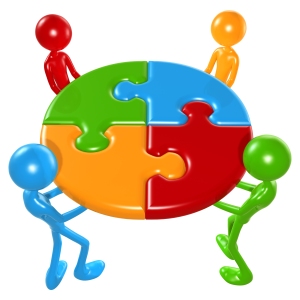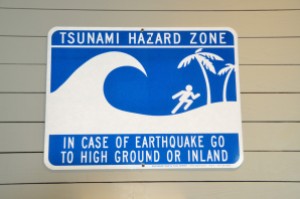
Teamwork! It is always a complicated topic in libraries, and yet so very important for us to function together.
Maybe part of the problem with this is that few people are ever taught HOW to be part of a team. Assuming that one person will lead it all, and everyone else can hang back and criticize, is terrible teamwork. (Project Runway is starting their newest season, and you can watch it for some great examples of people who have no idea how to work together – despite that their professional lives literally depend on it!) (And, there is sewing. It’s not all management lessons!)
Many people have studied teamwork, in an effort to figure out how we can be better at it, and get better results. In 1965 Bruce Tuckman developed a model of team development that has provided a good road map for teams to follow as they develop. He suggested a few defined stages:
- Forming: the initial coming together, good behavior by everyone, not yet really together
- Storming: conflicts arise as the group gets organized, with different ideas and strategies bumping against each other; this does not mean things are going badly – it is part of the growth!
- Norming: moving past the conflicts and everyone is feeling like a team – ready to wear matching shirts or other signs of team harmony
- Performing: getting down to the action, with everyone ready to move the team forward toward the goal
- Adjourning: this stage was added in 1997, working with Mary Ann Jensen; this describes that when the team purpose has ended, there is a sadness everyone feels that needs to be acknowledged.
Even just knowing that there are stages and paths to better team action can be helpful to people who may feel doubtful about participating. I have spoken with many library managers and directors who are not happy with the way their staff works in teams; more experience in how a good team can work would be helpful to everyone!
So, what does this have to do with marshmallows? Tom Wujec is here to explain! Watch his TED Talk and see how he gets teams to collaborate, and how they can get started on big projects.
Have you done a marshmallow test? Try it out before you read all about it – you don’t want to spoil your experience! If you have a team project coming up, or want to help your staff teams start off with a fun experience (that’s one of those “cheery-fake” activities that annoys people), try a marshmallow problem to get everyone working together.
Think about the teams in your library. You may work with a team of people who do what you do (preservation, kid books, cataloging, and more), and you also work with a larger team of people who all are interested in the work of your library (Board members, teachers, students, and more). Getting everyone to work together and master the performing stage is a challenge; but working with some structures that help to guide people into more effective teamwork can help make it a better experience for everyone involved!
- Adjourning




